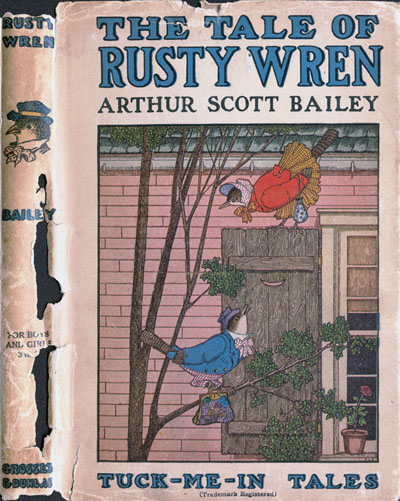
Title: The Tale of Rusty Wren
Author: Arthur Scott Bailey
Illustrator: Harry L. Smith
Release date: June 17, 2008 [eBook #25824]
Language: English
Credits: E-text prepared by Joe Longo, Suzan Flanagan, and the Project Gutenberg Online Distributed Proofreading Team
E-text prepared by Joe Longo, Suzan Flanagan,
and the Project Gutenberg Online Distributed Proofreading Team
(http://www.pgdp.net)

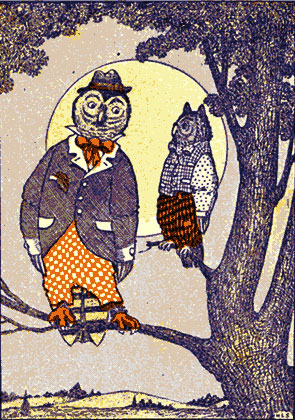
"It's All Right," Said Solomon |
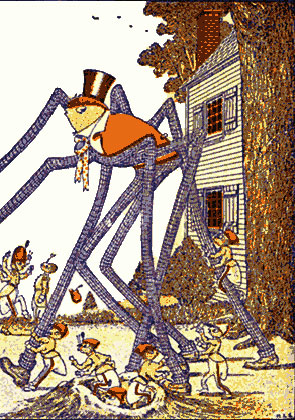
The Ant Soldiers Rushed at Daddy |
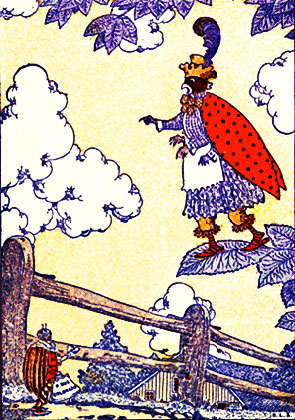
Mrs. Ladybug Directs Mr. Potato Bug. |
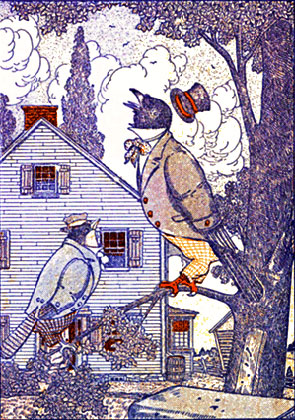
"What's The Joke?" Asked Rusty Wren |
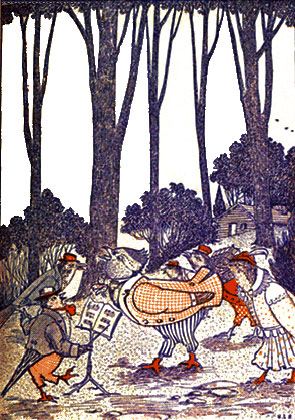
Jasper Shrieked at the Top of His Voice |
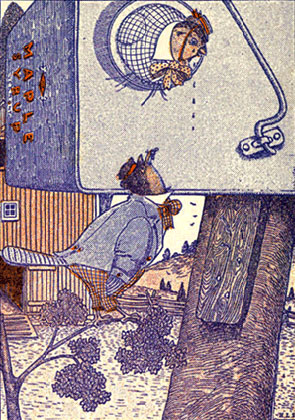
"This Boy's Stuck Fast In Our Door!" |
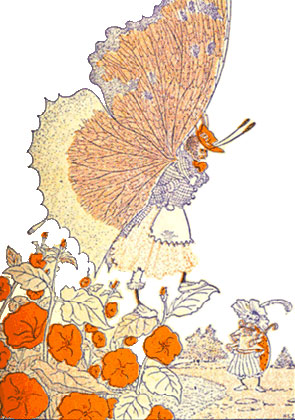
Betsy Listened With Amazement to Mrs. Ladybug. |
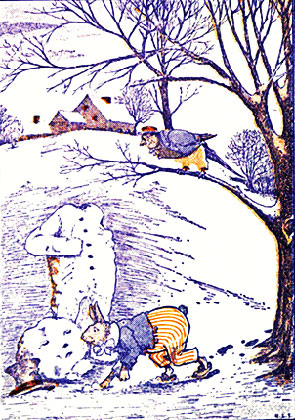
Jolly Robin And Jimmy Rabbit Inspect The Snow-Man |
| TUCK-ME-IN TALES (Trademark Registered) |
| by ARTHUR SCOTT BAILEY |
| author of SLEEPY-TIME TALES (Trademark Registered) |
| The Tale of Jolly Robin The Tale of Old Mr. Crow The Tale of Solomon Owl The Tale of Jasper Jay The Tale of Rusty Wren The Tale of Daddy Longlegs The Tale of Kiddie Katydid The Tale of Buster Bumblebee The Tale of Freddie Firefly The Tale of Betsy Butterfly The Tale of Bobby Bobolink The Tale of Chirpy Cricket The Tale of Mrs. Ladybug The Tale of Reddy Woodpecker The Tale of Grandmother Goose |
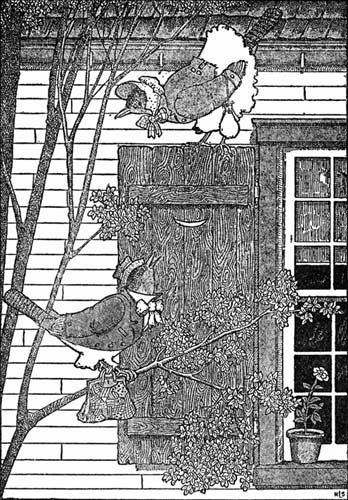 “That Won’t Do,” Said Rusty Wren
“That Won’t Do,” Said Rusty WrenTUCK-ME-IN TALES
(Registered Trademark)
THE TALE OF
RUSTY WREN
BY
ARTHUR SCOTT BAILEY
Author of
"SLEEPY-TIME TALES"
(Registered Trademark)
ILLUSTRATED BY
HARRY L. SMITH
NEW YORK
GROSSET & DUNLAP
PUBLISHERS
Made in the United States of America
Copyright, 1917, by
GROSSET & DUNLAP
| chapter | page | |
| I. | A Pleasant Home | 1 |
| II. | Johnnie Green’s Idea | 6 |
| III. | The Alarm Clock | 11 |
| IV. | Rusty Is Jealous | 16 |
| V. | The New Bird | 21 |
| VI. | Mr. Crow to the Rescue | 27 |
| VII. | A Neat Housekeeper | 33 |
| VIII. | Rusty in Trouble | 38 |
| IX. | All’s Well Again | 42 |
| X. | Bad News | 47 |
| XI. | The Noise on the Roof | 52 |
| XII. | The Unwelcome Visitor | 57 |
| XIII. | Boy Wanted! | 62 |
| XIV. | Too Many Callers | 67 |
| XV. | Mr. Chippy’s Son | 72 |
| XVI. | The Accident | 77 |
| XVII. | Help! Help! | 82 |
| XVIII. | The Puzzle | 87 |
| XIX. | A Friend, Indeed | 92 |
| XX. | An Invitation | 99 |
| XXI. | Off to Black Creek | 104 |
| XXII. | The Forgotten Guest | 109 |
| XXIII. | A Strange Mistake | 114 |
Now, Rusty Wren had found—and shown to his wife—a hollow apple tree and a hole in a fence-rail, either of which he thought would make a pleasant place in which to live.
But since the little couple were house wrens, Rusty’s wife said she thought that they oughtn’t to be so far from the farmhouse.
“Why not build our nest behind one of the shutters?” she suggested.
But Rusty shook his head quickly—and[2] with decision.
“That won’t do,” said he. “Somebody might come to the window and close the shutter; and then our nest would fall to the ground. And if we happened to have six or eight eggs in it, you know you wouldn’t like that very well.”
Rusty’s wife agreed with him on that point. But she still insisted that she wanted to live near the farmhouse; and she said that she expected her husband to find a good spot for their nest, for she certainly wasn’t going to spend the summer in a hole in a fence-rail, or in an old apple tree, either.
Rusty Wren saw at once that there was no sense in arguing with her. If he wanted any peace, he knew that he might as well forget the old hollow apple tree and the hole in the fence-rail too. He had better forget them and resume his search for a[3] home. So he gave his plump little cinnamon-colored body a shake and held his tail at even a higher angle than usual, just to show people that he was going to be the head of the house—when they should have one. Then with a flirt of his short, round wings he hurried over to Farmer Green’s dooryard—after calling to his wife that he would come back and tell her if he had any luck.
Rusty Wren spent some busy moments about Farmer Green’s buildings. And since he loved to be busy and was never so happy as when he had something important to do, he hopped and climbed and fluttered to his heart’s content, looking into a hundred different holes and cracks and crannies.
But he didn’t find a single one that suited him. Every place into which he peered was either too big or too little, or[4] too high or too low; or it was where the rain would beat upon it; or maybe it was so situated that the cat could thrust her paw inside. Anyhow, every possible nook for a nest had some drawback. And Rusty was wondering what he could say to his wife, who was sure to be upset if her plans went wrong, when all at once he came upon the finest place for a house that he had ever seen. One quick look through the small round opening that led to it was enough.
He knew right away that his search was ended. So he hurried back to the orchard to find Mrs. Rusty and tell her the good news.
“I’ve found the best spot for a house in all Pleasant Valley!” he cried, as he dropped down beside her and hopped about in his excitement.
“Is it in a good neighborhood?” she inquired[5] calmly.
“Yes, indeed!” he replied. “It’s in a tree close to Farmer Green’s bedroom window.”
“A hole in a tree!” she exclaimed somewhat doubtfully. “Not an old squirrel’s nest, I hope?”
“No, no!” he assured her. “It’s not really in a tree. It’s nailed to a tree. Come with me and I’ll show you.”
At that the bustling little pair hastened toward the farmhouse. And, to Rusty’s delight, the moment his wife saw what he had found she said at once that it was exactly the sort of house she had always hoped to have, some time.
It happened that just before Rusty Wren and his wife came to Pleasant Valley to look for a home, Johnnie Green had an idea.
He found the idea in the weekly paper which the letter-carrier left each Friday in the mail box at the crossroads. On the Children’s Page Johnnie read a story about a pair of house wrens. And he learned then that an old tin can nailed to a tree makes exactly the sort of house that wrens like.
Well, Johnnie Green began at once to look for a tin can. He had made up his mind that he would try to coax a couple[7] of those busy little songsters to nest near-by, where he could have fun watching them.
Not finding an old tin can that suited him, Johnnie took a shiny maple syrup can, which his father said he might have. It seemed to him that it was just the kind he needed, for the only opening in it was a small round hole in the top, hardly bigger than a twenty-five-cent piece. (The story in the weekly paper said that the wrens’ doorway should be as small as that, so that no ruffianly English sparrows could enter the house and disturb the little people that were to dwell there.)
Johnnie Green punched a few nail holes in the sides of the syrup can, because he thought that if he lived in such a place, he would want plenty of fresh air. Then he nailed a board to the can. And next he nailed the board to a cherry tree close[8] to the house.
After that Johnnie had nothing more to do but wait. And he had not waited two days before Rusty Wren discovered the bright tin can that was to be his summer home.
As soon as she saw it, Rusty’s wife said that there must be kind people living in the farmhouse, or they never would have driven nails through a spick-and-span can just to make strangers happy.
Since their search was ended, the tiny pair began building their nest right then and there. In a surprisingly short time they had completely filled their new house with twigs. And as soon as they had done that much, in the center of the mass of twigs they built a nest of dried grasses, singing the merriest of songs while they worked.
Of course, Johnnie Green was delighted.[9] All the time the lively little couple were at work upon their new home it was easy to find Johnnie. But it was hard to get him to do any errands, because he didn’t want to stir from the dooryard, he was so interested in what was going on.
Farmer Green, too, seemed pleased. And though he didn’t spend much time watching Mr. and Mrs. Rusty (he said that he had to work, the same as they), he remarked to Johnnie that he was glad to see that the newcomers were already paying rent for their house.
Johnnie Green looked puzzled.
“Rent?” he exclaimed. “I don’t understand.”
“Just hear them!” his father replied. “Isn’t their singing pay enough for the use of a tin syrup can?”
“That’s so!” cried Johnnie. “I never[10] thought of that. Why, they’ve turned that can into a regular music-box!”
All summer long Farmer Green rose while the world was still gray, before the sun climbed over the mountain to flood Pleasant Valley with his golden light.
One might think that Farmer Green would have had some trouble awaking so early in the morning. And perhaps he might have overslept now and then had he not had a never-failing alarm clock to arouse him.
It was not one of those man-made clocks, which go off with a deafening clatter and bring a startled body to his feet before he is really awake. No! Farmer Green had something much pleasanter[12] than that; and it was not in his bedroom, either.
His alarm clock was in his dooryard, for it was Rusty Wren himself who always warned him that day was breaking and that it was time to get up and go to work.
Every morning, without fail, Rusty sang his dawn song right under Farmer Green’s window. His musical trill, sounding very much like the brook that rippled its way down the side of Blue Mountain, always made Farmer Green feel glad that another day had come.
“If that busy little chap is up——” he often said, meaning Rusty Wren, of course—“if he’s up there’s no reason why I should lie here and sleep.”
And since everybody else in the house followed Farmer Green’s custom of rising early, it happened that so small a bird[13] as Rusty Wren aroused the whole household out of their beds.
To be sure, Johnnie Green—sitting up and rubbing his eyes sleepily—sometimes wished that Rusty would skip his dawn song once in a while. And he told his father at breakfast one day that since he was not a bird, he saw no reason why he should get up with the sun.
“You needn’t,” said Farmer Green. “But you know the old saying about ‘early to bed and early to rise,’ don’t you?”
Johnnie remembered that such habits were supposed to make one “healthy, wealthy and wise.” And since he hated to take medicine, and was trying to save enough money to buy him a gun, and disliked to be kept in after school for not knowing his lessons, he decided that perhaps it was just as well, after all, to follow[14] Rusty Wren’s example.
Now, Farmer Green spoke so often and so pleasantly of Rusty Wren, saying that nobody could want a better little alarm clock than he, that Rusty began to take a great deal of pride in his morning task of awakening the household. It could hardly be called a task, however, because Rusty thoroughly enjoyed singing, though when he sang—as when he did anything else—he put every ounce of his strength into the effort. With his head lifted as high as his short neck would permit, and his tail (which usually stuck pertly upwards) drooping downward, as if he had for the moment forgotten it, he poured forth his music with such fervor that his small body actually trembled.
You see, Rusty Wren never did things by halves. When he did anything he was never satisfied with less than his best.[15]
And that was another reason why Farmer Green liked him.
Before Rusty Wren came to live in Farmer Green’s dooryard the family had been known to oversleep now and then. Working hard all day long as everybody did (except Johnnie Green, who played hard enough—goodness knows!), they slept very soundly at night. And two or three times every summer they were sure to rise late, just by accident.
Though such a mishap always annoyed Farmer Green, it never troubled either the hired man or Johnnie in the least. On the contrary, they seemed to enjoy those occasions. But with Rusty Wren to rouse them at dawn all that was changed. And[17] Farmer Green remarked one day that one thing was certain; they would lose no time that summer by staying in bed too long.
That very afternoon he had to go to the village. And when he came home he brought several surprises with him.
Those surprises pleased Johnnie and his mother so much that when he went to bed that night Farmer Green felt even happier than was usual with him. He went to bed somewhat early because he said he had more work than ever to do the next day, on account of his having gone to the village.
But happy as he was that night, the following morning Farmer Green was quite out of sorts. For the whole family overslept. Not a soul awaked until the sun had been up at least an hour.
“I don’t understand——” Farmer[18] Green said at the breakfast table—“I don’t understand why I failed to hear that wren this morning. I must have been unusually sleepy.”
The hired man helped himself to some more griddle-cakes and remarked that it was a pity. But somehow he did not look sorry, in spite of what he said.
“We’ll go to bed early to-night,” Farmer Green continued, “so we’ll be sure to wake up before sunrise.”
And, strange to say, the next morning the very same accident happened again.
“I don’t see what’s come over me,” said Farmer Green. “I don’t hear that wren singing right under my window any more. I thought that maybe the cat had caught him. But there he is this very moment, on that limb!”
Everybody said it certainly was odd, for the wren always sang as soon as it began[19] to grow light.
Well, that night Farmer Green went to bed before dark, declaring that he must be up bright and early in the morning.
“I wish that new clock I brought home day before yesterday was an alarm clock,” he said. “Then I wouldn’t have to worry about waking up on time.... Anyhow, I ought to hear the wren again to-morrow morning.”
But Farmer Green hoped in vain. Though the cat had not caught Rusty, and he had not moved away, either, he no longer sang beneath Farmer Green’s window at dawn.
For three mornings he had gone to the orchard to trill his dawn song; and though they did not know the reason, that was why the Green family rose late for three mornings running.
Once Rusty Wren had been proud to be[20] called Farmer Green’s alarm clock. But now something had happened that made him resolve to stop waking the household.
It was all on account of one of those surprises that Farmer Green had brought home from the village. For without intending to do any such thing, Farmer Green had surprised Rusty Wren as well as Johnnie and his mother.
Now, a surprise may be one of two kinds—pleasant or unpleasant. And, strangely enough, the very thing that delighted the Green family sent Rusty Wren into a spasm of jealous rage.
Of course, it was very silly of him to lose his temper. But he was too upset to stop to think of that.
Farmer Green had not been home long, after his trip to the village, when Rusty Wren heard a sound that for once made him keep quite still for at least five seconds.
“Cuckoo! cuckoo!” The cry came from inside the farmhouse. And since the windows were wide open, Rusty could easily hear it from the tree near-by, where he lived.
“There’s a new bird in there!” Rusty Wren exclaimed to himself as soon as the sound reached his ears. He listened intently. But the call was not repeated.
“Farmer Green is not satisfied with my[22] singing!” Rusty cried. And thereupon he flew into such a rage that when his wife came home, a few minutes later, she was actually frightened.
“What in the world is the matter?” she asked her husband anxiously.
“Matter?” cried Rusty Wren. “Here I’ve sung my best for Farmer Green all summer, and waked him at dawn every morning without fail! And what do you suppose he’s done? He has brought home a strange bird from the village, because he doesn’t care for my singing.”
Mrs. Rusty Wren told her husband that he must be mistaken.
“Maybe a bird flew inside the farmhouse by accident,” she said. “What kind of bird is it?” she inquired.
“It said ‘Cuckoo!’” Rusty explained. “But if it’s a cuckoo, it’s different from any other I’ve ever heard. You know[23] yourself that Black Bill Cuckoo who lives in the bushes beyond the orchard says ‘Cow, cow!’”
“I wouldn’t worry, if I were you,” Mrs. Rusty advised her husband. “No doubt this strange bird has already made his escape.”
It was then after sunset. And soon Rusty Wren’s family were all fast asleep, without having heard any more bird notes from the farmhouse.
The next morning Rusty awoke just as the first streaks of gray showed in the east. He was about to begin his dawn song when through the kitchen window came that “Cuckoo! cuckoo!” again.
Rusty knew then that the strange bird was still there.
“Did you hear that?” he asked his wife.
She nodded her head silently.
“He’s telling Farmer Green that it’s[24] time to get up!” Rusty exclaimed indignantly. “And since Farmer Green has seen fit to get somebody else to wake him, I certainly shall not trouble myself on his account any more.”
So Rusty Wren flew away to the orchard to sing his dawn song. Jolly Robin, who lived there, in an old apple tree, was surprised to hear Rusty Wren singing in that neighborhood so early. And he was still more astonished at Rusty’s melody.
His voice was so much shriller than usual that Jolly Robin knew instantly that something had displeased him.
“What’s happened to upset you?” Jolly Robin inquired, after Rusty had finished singing.
“I expect to come here and give my dawn song every morning,” Rusty remarked. “And if there’s anybody living in the orchard that objects, he had better[25] move away at once.”
Of course Jolly Robin didn’t want to do that. And he said as much, too.
“But I hope you’ll sing a little more happily,” he told Rusty, “because I don’t like to hear people complaining—and neither does my wife.”
It is easy to understand why Farmer Green and his family overslept, when one knows that Rusty Wren no longer sang his dawn song beneath Farmer Green’s window. And when Rusty saw that the whole household never stirred until long after sunrise, he was so pleased that he couldn’t help making a few remarks about the new bird in the farmhouse, which had annoyed him so by singing “Cuckoo! cuckoo!”
“This stranger is a very poor songster!” Rusty said to his wife. “All he[26] can sing is ‘Cuckoo! cuckoo!’ in that silly way of his. He has no trills and runs and ripples at all! And he can’t even repeat his song ten times a minute, as I give mine. He has to wait at least half an hour before he cries ‘Cuckoo! cuckoo!’ again. And no one but a simpleton would ever attempt to awaken a hard-working farmer by such half-hearted singing.”
Mrs. Rusty quite agreed with her husband.
“Farmer Green will be sorry he brought home such a worthless bird,” she said.
As time went on, and the Green family overslept each morning, Rusty began to grow very weary of the monotonous “Cuckoo! cuckoo!” which came every half hour, all day long, through the kitchen window of the farmhouse.
“I’d like to know what sort of bird that is!” he exclaimed at last. “If he’d only come out here in the yard I’d ask him his name—and tell him what I think of him, too.”
But the stranger never stirred out of the kitchen. And at length Rusty decided to make inquiries about him. Seeing Jimmy Rabbit passing through the orchard[28] on his way home from the cabbage-patch, Rusty called to him.
“If you happen to see old Mr. Crow, I wish you would ask him if he won’t please come right over to the orchard,” Rusty Wren said. “There’s something I want to find out. And Mr. Crow knows so much that perhaps he can help me.”
Jimmy Rabbit declared that he would be delighted to deliver the message. And he must have gone out of his way to find Mr. Crow, for the old gentleman arrived at the orchard in less than sixteen minutes.
Rusty was waiting for him. And, having explained about the strange bird as well as he could, he asked Mr. Crow what he thought.
“I’d like to hear his song,” said old Mr. Crow.
“Come right over to my tree near the[29] house!” Rusty urged him.
Mr. Crow hesitated.
“Where’s Farmer Green?” he inquired.
“Oh! He’s working in the hayfield.”
“Where’s Johnnie Green?” Mr. Crow asked.
“Oh! He’s in the hayfield, too, riding on the hayrake,” Rusty Wren explained.
“I’ll come with you, then,” Mr. Crow croaked.
So they flew to the dooryard. And they hadn’t waited there long when the strange bird sang his “Cuckoo! cuckoo!”
“There!” said Rusty. “That’s his silly song!”
And to his surprise Mr. Crow haw-hawed right out.
“What’s the joke?” Rusty Wren wanted to know.
“That’s not a bird——” said old Mr. Crow—“or, at least, it’s not a[30] real bird. He’s made of wood. And he lives inside a cuckoo clock.”
“Ah!” Rusty cried. “An alarm clock!”
But old Mr. Crow shook his head.
“No!” he replied. “It’s just an everyday clock. And, instead of striking, it lets this little wooden bird come out and sing.”
Rusty Wren said that he wouldn’t care for a clock like that and that he didn’t see why Farmer Green had brought it home, anyhow.
“Cuckoo clocks amuse the women and children,” Mr. Crow remarked wisely.
“Then you think Farmer Green was not dissatisfied with my singing? You think he would like me to wake him every morning, just as I used to?” Rusty waited eagerly for Mr. Crow’s opinion.
Old Mr. Crow pondered for a while before answering. He reflected that[31] since it was long past corn-planting time, it really made no difference to him whether Farmer Green overslept or not. If the corn had just been put in the ground, he would have liked to have Farmer Green stay in bed all day long.
“I understand that the whole family enjoys your songs,” Mr. Crow told Rusty at last. “And for the present you may as well sing your dawn song right here in your own tree, beneath Farmer Green’s window. But if you’re living here next spring, I wish you would consult me again.”
Rusty Wren agreed to that, thanking Mr. Crow for his kindness, too. And, afterward, instead of being angry, he laughed whenever he heard that silly “Cuckoo! cuckoo!” Since he knew it was only a wooden bird, Rusty Wren was jealous[32] no longer.
The next morning he awakened Farmer Green at the break o’ day. And the hired man was so sleepy that he fell downstairs and couldn’t work for a whole week.
Rusty Wren’s wife was a very neat housekeeper. Every day she carefully cleaned her house, chirping while she worked. Sometimes her voice was sweet and pleasant. But at other times—though it was still sweet—it was not pleasant at all. And whenever Rusty heard that second kind of chirp he was always careful to find some errand that took him away from home.
You see, Rusty Wren was not so orderly as his wife. Often he scattered things about the house in a very careless fashion. For instance, if he happened to notice a bit of moss—or a burr—clinging to[34] his coat, just as likely as not he would brush it off and let it fall upon the floor. And when Mrs. Rusty found anything like that in her cottage, she always knew how it came there.
Rusty sometimes remarked that it was a good thing he didn’t smoke.
“How would you like it if I dropped bits of tobacco, or ashes, and maybe burnt matches for you to pick up?” he asked his wife.
“You couldn’t come inside my house if you used tobacco,” she always replied. And she would get quite excited at the mere thought of such an untidy habit.
And then Rusty would smile—but he always took good care not to let his wife see him.
“Don’t worry!” he would say, if she became too stirred up. “I’ve never smoked yet—and I never expect to.”[35]
One can see that Rusty Wren was somewhat of a tease. And as it usually happens with people who amuse themselves at the expense of others, there came a time when Rusty’s teasing landed him in trouble.
One day after he had come home from an excursion to the pasture (he seldom strayed so far from home as that!), Mrs. Rusty began sniffing the air. Her nose would have wrinkled—only it couldn’t, because it was so hard. She looked at her husband suspiciously. And it seemed to her that he had a guilty manner.
“I declare,” she said, “I believe you’ve been smoking.” And she started to scold so angrily that Rusty Wren knew she must be in a temper.
Seeing signs of trouble, Rusty began to fidget. And he moved about so uneasily that his wife was all the surer of his guilt.[36] She stopped right in the middle of her scolding to say, “I smell smoke!”
“Perhaps you do,” Rusty admitted. “But it’s certainly not tobacco smoke.”
“Ah!” she exclaimed. “Then you’ve been smoking corn-silk, or hayseed—and that’s almost as bad.”
But Rusty said that it must be the smoke of a pine stump that she noticed.
“Farmer Green is burning some old stumps in the pasture,” he explained. “And I flew through a cloud of it.”
Just then he happened to notice a bit of something or other clinging to one of his tail feathers. And though his wife was looking straight at him, he flicked the tiny scrap upon the floor, without thinking what he was doing.
“There you go again!” Mrs. Rusty Wren cried. “Here I’ve just finished cleaning the house and you’re littering it[37] all up! You don’t care how much work you make for me.” And she pounced upon the brownish bit, intending to pick it up and throw it out of the house.
Rusty had already decided that he had better go away from home for a little while, until things were pleasanter, when his wife suddenly faced about and fixed him with her glittering eyes.
“Ha!” she cried, holding up the scrap in her bill for him to see. “Tobacco!” she screamed. “And what, pray, have you to say to me now?”
Rusty Wren edged toward the door—that little opening in the syrup can, only slightly bigger than a twenty-five-cent piece. He wished he was already safely through it, for he did not like the look in his wife’s eyes.
“I must be going now,” he said faintly—though he was generally as bold as brass.
“Wait a moment!” Mrs. Rusty ordered. “Where did this tobacco come from?” She spoke somewhat thickly, for she still held the bit of brown leaf in her bill.
“I can’t imagine,” he stammered. “I never knew it was sticking to my tail until[39] I saw it and brushed it off——”
“On my clean floor!” his wife interrupted. “Goodness knows it’s bad enough to have you forever doing things like that without your bringing tobacco into my clean house—and without smelling of smoke, too.”
For almost the first time in his life Rusty Wren was really worried. Somehow, he had managed to get into something a good deal like a scrape. It seemed to him that the house was terribly hot and stuffy; and always before he had thought it quite comfortable.
“I’m going out for a breath of fresh air,” he protested feebly. And before Mrs. Rusty could stop him he dodged past her and slipped through the tiny doorway, leaving her to scold to her heart’s content.
All this happened in the middle of the[40] morning. And the cuckoo clock in Farmer Green’s kitchen had sung the hour six times before Rusty Wren returned.
Never before had he stayed away from his snug house so long. And, naturally, that made him have a guilty feeling, as if he had really done something to be ashamed of. As for smoking, he had (as he said) never smoked in his life. It was true that Farmer Green was burning stumps in the pasture that morning, and that the odor of the smoke had clung to Rusty’s feathers.
But the bit of tobacco that had clung to his tail was a mystery that he couldn’t explain. It was a most unfortunate accident. But Rusty hoped that by that time—it was then the middle of the afternoon—he hoped that his wife had recovered from her displeasure. Usually, when they had any little difference of opinion,[41] she felt better if he gave her plenty of time in which to scold. But now Rusty was not quite sure of his welcome. He had never seen Mrs. Rusty so upset.
“Are you there, my love?” he asked softly, as he alighted on the roof of his house. He did not care to go inside until he was quite sure that his wife was in better spirits.
“The smoker has come home again,” a peevish voice called out. And instead of bursting into the merry song which Rusty had been all ready to carol, he flew off across the yard and began hunting for something to eat.
Since he couldn’t very well go home, he thought that he might as well enjoy a good meal, at least.
After Rusty Wren had revived his drooping spirits by eating heartily of three dozen insects of different kinds and sizes, he felt so cheerful that he couldn’t help trilling a few songs. It was almost evening; and he was glad not to let the sun go down without thanking him in that way for shining so brightly all day.
Though it was so late, Farmer Green still toiled in the fields; but Rusty could hear Johnnie and old dog Spot driving the cows down the lane towards the barn.
Now, above the wide door of the carriage house a window was open—a window through which Rusty had flown early[43] in the morning. Unlike old Mr. Crow, Rusty Wren was not in the least afraid to enter any of the farm buildings. Perhaps if Rusty had been in the habit of taking Farmer Green’s corn he would have thought twice before he ventured inside the cow barn or the carriage house. But since he never damaged the crops, and always helped them by destroying a great number of insects that ate all sorts of growing things, Rusty had nothing whatever to fear from anybody in the farmhouse—except the cat, of course.
There was really no reason for Rusty’s flying through the open window, beyond the fact that he liked to prowl around the great, dusty room under the eaves, to see what he could find. Once he was inside, he noticed something that had not caught his eye on his former visit. Hanging from a rafter, where the slanting rays[44] of the setting sun fell squarely upon it, was a big bunch of brown tobacco leaves.
Rusty Wren gave a chirp of pleasure at the sight. That was where he must have picked up the bit of tobacco that had clung to his tail feathers and upset his wife’s good nature.
“I’ll go right home and get her and bring her here so she can see this tobacco herself!” he said aloud. “Then she’ll know where that shred came from which fell on the floor.” He did not say “which I brushed onto the floor,” for he never could remember long that he ever did such careless things.
Well, Rusty Wren went out of the window a good deal faster than he had flown in. And, in less time than it takes to tell it, he was perched on top of his house again and calling to his wife.
“I know now where the tobacco came[45] from!” he sang out. “Just come outside and I’ll show you. It’s upstairs in the carriage house!”
To his delight, Mrs. Rusty answered in the sweetest tone imaginable. But she said she didn’t want to come out just then. And she didn’t seem a bit interested in tobacco any more.
“You come right into the house!” she cried. “There’s something here that I want to show you.”
Rusty Wren whisked through the hole in the maple syrup can. Home had never looked quite so good to him before, for he had not been there since the middle of the morning.
“What is it?” he asked eagerly.
His wife was sitting on their nest. And there was nothing new in the house, so far as he could see.
She moved aside then. “Look!” she[46] said.
And, peering into the nest, Rusty saw a speckled egg there. It was really a small egg. But to Rusty Wren’s eyes it seemed decidedly big.
He was so surprised that he couldn’t speak for as much as two seconds. And then he began to sing—he was so happy.
Though Mrs. Rusty kept very still, she seemed much pleased. And, strange to say, she never mentioned smoking to her husband again.
She had something more important to think about.
When Johnnie Green fastened the tin can to the tree in the dooryard he couldn’t have picked out a better spot for it. Of course, he hoped that a pair of wrens would build their nest inside the syrup can. But what he never dreamed was that the cherry tree was exactly the sort of tree that wrens liked.
It was not that Rusty and his wife cared for cherries. But as soon as Mrs. Wren had said how much she liked her new house, she remarked that the old cherry tree was a fine place to hunt for bugs and insects.
“Yes!” Rusty agreed. “And there’s[48] an ant hill near the foot of the tree. It will be very convenient on stormy days, for we shall not have to go far for our breakfast.”
Not being fond of cherries, they did not look forward to the time when the bright red fruit should hang gaily upon the branches above their home. But there were others—besides Johnnie Green—who eagerly awaited that time and noticed that the old tree was loaded with blossoms, which meant that later there would be plenty of cherries.
Jolly Robin was one of those who had a taste for cherries, no matter whether they grew wild in the woods or within easy reach in Farmer Green’s yard. And as soon as cherry time arrived Jolly was on hand every day to enjoy the treat.
He was so cheerful and good-natured that Rusty Wren and his wife did not object[49] to Jolly’s visits—so long as he did not venture too near their house. They always scolded loudly when an outsider came too close to their home, for they had a big family of children, and they couldn’t help feeling that the youngsters were safer with no prying busybodies to meddle with them.
Of course, Jolly Robin never once thought of harming any of Rusty’s family. And as soon as he saw that Rusty—and especially his wife—wanted him to keep away from their side of the tree, he took care to respect their wishes.
Then all was peaceful. And the three had many pleasant chats together.
At last, however, Jolly Robin made a remark one day that threw both Rusty and his wife into a flutter of alarm. Jolly Robin had not meant to frighten them. But the news was out before he realized[50] that it was far from welcome to his two little listeners.
“Jasper Jay has heard about these cherries,” he announced. “And he says he’s coming over here as soon as he can find time, for he is specially fond of all kinds of cherries, no matter whether they’re red cherries or black cherries or choke cherries.”
Rusty Wren glanced quickly at his wife.
He could easily see that Jolly Robin’s speech had upset her. And, to tell the truth, he did not himself relish the prospect of a visit from anybody as boisterous and quarrelsome as that famous bully, Jasper Jay.
“Can’t you prevent his coming?” Rusty asked Jolly Robin.
But Jolly Robin shook his head.
“When Jasper Jay makes up his mind,[51] I know of no way to make him change it,” he said.
As soon as she heard that Jasper Jay intended to visit her cherry tree, to enjoy the ripe fruit, Rusty Wren’s wife began to worry. And she made herself so unhappy that Rusty couldn’t help wishing that Jolly Robin had kept his news to himself.
“Don’t be alarmed!” he said to her, after Jolly had gone. “Jasper Jay can’t harm the children, for they’ll be safe in the nest. And luckily our doorway is too small for him.”
But Mrs. Rusty wouldn’t be calmed.
“He’s a great, cruel bully,” she replied. “And if he spends much time here I’m[53] afraid the children will starve, for neither you nor I will be able to go out and find food for them, because Jasper would be sure to pounce on us; and what chance would we have against him?”
“We’ll go together,” said Rusty Wren, looking very brave.
But Mrs. Wren said she wouldn’t think of leaving her six small children all alone in the house.
“Everything will be all right,” Rusty assured her. “You know Jasper isn’t coming unless he can find the time. Jolly Robin said so. And maybe he won’t be able to get here at all.”
They had gone inside their house to talk over the matter in private. And Rusty had hardly finished speaking when a loud bang, followed by a clatter, sounded on the tin roof above their heads.
It was no wonder that they both[54] jumped.
“Goodness!” exclaimed Rusty’s wife. “What’s that?”
But Rusty couldn’t tell her. During all the weeks they had lived there he had heard nothing like that.
While they listened the noise was repeated. And Mrs. Rusty declared that the sky must be falling, for she had never heard such a dreadful sound in all her life.
“I’ll go right out and see what it is,” Rusty Wren said.
But his wife caught hold of his coat-tails and begged him to stay with her.
“No! no!” she cried. “You must not stir out of the house. I’d be terribly worried if you left me alone here with these six small children. And you might get hurt, besides.”
Meanwhile the racket on the roof continued,[55] with only a short pause between each outburst. The six Wren children began to cry—for they were hungry as well as frightened. And all the time Mrs. Rusty clung to her husband’s coat-tails and besought him not to leave her.
To tell the truth, he had no such intention. Though he was very brave for his size, he was thoroughly alarmed. And for the time being he was quite content to stay inside his snug house and hope that the trouble would soon come to an end.
On the whole, the Wren family spent a very unpleasant quarter of an hour. The bang, clatter, bang on their roof still continued until the din became almost unbearable. And Rusty Wren grew so desperate that he had almost made up his mind to break away from his wife, even[56] if he had to leave his coat-tails behind him, and dash out of doors to see what was the matter.
Then all at once a different sound fell upon their ears. And as soon as they heard it they knew at once that the sky was not falling, anyhow.
“Jay! jay!” Jasper Jay’s harsh voice was unmistakable. He had been playing one of his sly tricks on the Wren family; and they had never guessed that it was he!
“It’s Jasper Jay!” Rusty Wren cried, as soon as he and his wife heard the hoarse cry outside their house. “He’s playing one of his tricks on us. And I’m going out and tell him exactly what I think of him.”
“Don’t forget to tell him what I think of him, too!” Mrs. Rusty said, as she let go of her husband’s coat-tails.
Then Rusty hurried through the little doorway. And there was Jasper, sitting on a limb above the house, with a cherry in his bill, which he let fall with a sly smile.
The cherry struck the roof of Rusty’s[58] house with a loud bang! And then came the same clatter, to which the Wren family had been listening.
“Here! Stop that!” Rusty cried.
Jasper Jay shrieked with laughter.
“Go away!” said Rusty.
“Go away yourself!” retorted Jasper.
“This is my home,” Rusty Wren told him hotly. “And you’ve no right to come here and frighten my wife and children like this.”
“How shall I frighten them, then?” Jasper Jay asked him. “Perhaps you like this way better!” he shouted. And with that he flew straight at Rusty Wren. He was so big and he looked so cruel that Rusty turned tail and dashed back into his house again. And he was glad that his doorway was not much bigger than a twenty-five-cent piece, because he knew that Jasper Jay could never squeeze[59] through so small an opening.
Jasper alighted on top of the house and jumped up and down on the roof, striking it with his bill and screaming angrily.
“Don’t be afraid!” Rusty said to his wife. “He can’t do any harm. And after a while he’ll grow tired of staying here and he’ll go away.”
Well, Rusty was half right, at least. For Jasper Jay went away at last; but he didn’t wait until he had grown weary of his rowdyish sport.
Now, Johnnie Green happened to hear Jasper’s harsh cries. And, looking out of the window, he saw Jasper’s strange performance.
“That blue jay is teasing my little wrens!” Johnnie Green cried indignantly. And, catching up a potato from the kitchen table, he hurried to the door and hurled it as hard as he could at the blue-coated[60] trouble-maker.
The potato missed Jasper Jay by less than an inch, bringing up kerplunk! against the trunk of the old cherry tree, and breaking into several pieces.
And then it was Jasper Jay’s turn to be alarmed. He jumped off the roof of Rusty Wren’s house as if he had been shot and dashed off as fast as his handsome wings could carry him. He knew of no way to tease Johnnie Green; so there was really no sense in his staying in Farmer Green’s yard any longer.
Johnnie jeered at Jasper as the frightened bully hurried away.
“You’d better not come skulking around here again!” he shouted.
Although the cherries hung red and juicy upon the old tree for at least a week longer, just begging to be picked—as one might say—Jasper Jay did not come back[61] to enjoy them. He told Jolly Robin that he was entirely too busy to waste his time in an old cherry tree.
It seemed to take Rusty Wren’s wife a long time to recover from the fright that Jasper Jay had given her. He had amused himself by dropping cherries upon the roof of her house. But the trick had not amused the Wren family in the least.
Even after Johnnie Green had driven the blue-coated rascal away from the dooryard Mrs. Rusty Wren was all aflutter. She jumped at the slightest noise. And she was so nervous that Rusty soon saw that it was a great effort for her to go abroad for food for their hungry family.
“You must stay right here at home and[63] rest,” he urged her. “I’ll find enough for the children to eat—and for you too,” he said manfully.
And really there was nothing else that his wife could do; for her nerves were in a frightful state.
So Rusty Wren took up his task cheerfully. He found it no easy one, either. Feeding six growing youngsters had kept both their parents working every minute all day long, because the children were always clamoring for more food. And now they seemed half starved, for they had had nothing to eat all the time that Jasper Jay had kept Rusty and his wife hiding in their house.
Rusty Wren, however, was not one to complain, no matter what happened. And every day from dawn till dark he hurried out of the house to find some toothsome insect, and bring it home to drop it into[64] somebody’s yawning mouth.
Indeed, he was so busy feeding his family that he scarcely had a chance to eat anything himself. So he grew quite thin. And though he still sang as merrily as ever, his wife noticed the change that had come over him.
Naturally, that made her worry. And since worrying was bad for her nerves, she began to grow worse instead of better.
“I don’t know what’s going to become of us,” she said at last. “As the children grow bigger they need more to eat. And I can see plainly that you’re never going to be able to provide enough for them.”
“Oh! they’ll soon be old enough to leave home and catch their own insects,” Rusty told her hopefully. “And until that time comes I’ll manage somehow, even if I have to work after dark.”
But that plan did not suit his wife at all.[65]
“I shouldn’t care to stay alone in the house at night with six small children,” she said. “That will never do.”
“I have it!” Rusty cried suddenly. “I’ll get somebody to help me!”
Well, his wife didn’t think much of that plan, either.
“I don’t like the idea of any strange bird coming into my house,” she objected. “And you know yourself that you’ve always felt the same way about strangers.”
“I know——” he replied—“but this is different. I’ll find a brisk young fellow somewhere. And after a day or two you won’t mind his being here. He’ll seem just like one of the family.”
It took a good deal of urging before Mrs. Rusty consented. But at last she said she was willing to give the plan a trial, though she felt sure it was bound to[66] cause trouble, somehow.
So that is how Rusty Wren came to hang a sign outside his door, which said:
BOY WANTED
The news of Rusty Wren’s sign, “Boy Wanted,” spread like wildfire through the whole of Pleasant Valley. Rusty had put the sign out at daybreak. And before sunset as many as fifty of the field and forest people had come shyly to Farmer Green’s dooryard.
Some of them came to apply for the position, and some of them merely wanted to see the sign—for it was a most unusual sight in that neighborhood.
There were others, too, such as Fatty Coon and Tommy Fox, who said that while they didn’t care to visit Farmer Green’s place in the daytime, they expected[68] to call there during the night and take a look at Rusty Wren’s home and the odd sign upon it.
Yes! So quiet a person as Rusty Wren, who never wandered far from home, had become famous in a day.
Yet it proved to be a very bad day for Rusty’s family, because he had almost no time at all in which to try to bring home any food. No sooner had he talked with one caller than another knocked at his door. And so the steady stream of strangers kept him busy as a little red wagon, as Farmer Green would remark.
It was a discouraging business, to say the least. Though Rusty had advertised for a “boy,” persons of all ages appeared and wanted to work for him. Some of them were old enough to be his grandfather. And, what was worse, they were all so big that they couldn’t squeeze[69] through Rusty’s little round door. (The hole in the syrup can, you will remember, was only slightly larger than a quarter of a dollar.)
Of course, there was no use of his hiring a helper that could do only half the work. What Rusty wanted was somebody that could not only catch an insect, but bring it right inside the house and drop it into the mouth of one of his children.
At last when Rusty had almost given up all hope of finding anyone of the required size, a young English sparrow flew up and said boldly that he was the very person for the position. He claimed that he could get in and out of Rusty’s door without any trouble. And he was just about to prove his claim, too, when Rusty Wren stopped him.
“Wait a moment!” he told the sparrow. “My wife is calling me. And I must see[70] what she wants.”
So he disappeared inside his house, to return shortly with a doleful look upon his face.
“I’m afraid you won’t do,” he said to the young English sparrow.
“Ha!” cried the stranger impertinently. “It’s easy to see that your wife rules the house. And, since that’s the case, I’m very glad I’m not going to work for you.” He flew away then, with a jeering laugh which made Rusty Wren feel quite uncomfortable.
Now Mrs. Rusty had overheard the talk outside her door. And she had no intention of letting any rude, noisy English sparrow—even if he was a young one—come inside her house.
That was why she called to her husband. And she made the matter so plain that Rusty knew there was no use of trying to[71] change her mind for her.
Things were growing worse and worse. The children were all cheeping for food, until Rusty Wren could hardly endure the noise.
And he, too, felt painfully hungry.
Rusty Wren was hurrying out of his house to find some supper for his family, when he almost bumped into a young chap who was gazing at the sign, “Boy Wanted,” which still hung outside Rusty’s door.
He was a likely-looking lad, who wore a bay cap on his head. And he had excellent manners, too. He said “Good-evening!” to Rusty very pleasantly and touched his cap. No doubt he would have taken it off had it not grown right on his head. “I see you want a boy,” he observed.
“I certainly do!” said Rusty Wren.[73] “What’s your name?”
“They call me ‘Chippy, Junior,’” the youngster told him.
“Is that so?” Rusty exclaimed. “Then your father must be Mr. Chippy, who lives in the wild grapevine on the stone wall by the roadside.”
Chippy, Jr., nodded brightly. And when he said, “Chip, chip, chip, chip,” Rusty knew that there could be no doubt about it.
“Wait just a moment!” he told Chippy, Jr. “I want to speak to my wife about you.” And then he darted back into his house.
“My dear,” he said to Mrs. Rusty, “I’ve found the very person! Little Mr. Chippy’s son is outside and I’m sure we ought to be glad to have a modest young man like him to help us.”
“He comes from a good family,” Mrs.[74] Rusty admitted. “But don’t you know that the Chippys are bigger than we are? Not much bigger, to be sure. But Mr. Chippy certainly couldn’t get through our doorway.”
“Quite true, my love!” Rusty Wren agreed. “But it’s his son—not he—that wants to work for us. And this young lad is not full grown. I should say he was hardly my size.”
Though his wife hesitated, she could think of no further objection. So at last she told Rusty that he might ask Chippy, Jr., to come back early the next morning.
“But I have a feeling that this is going to lead to trouble,” she said once more. Rusty Wren said, “Nonsense!” He was overjoyed at the prospect of having a spry young helper. And he hurried out to tell Mr. Chippy’s son that he might start to[75] work at daybreak.
That polite young man touched his cap again, promised that he would return without fail, and then went chip-chipping away toward home, for it was already his bedtime.
For all he was still hungry, Rusty Wren slept better that night than he had for a long while. He felt as if a great load had been lifted off his shoulders.
He slept so soundly, in fact, that he never waked up all when Fatty Coon and Tommy Fox came at midnight to view his sign, “Boy Wanted.”
They made a good deal of noise, too, grumbling not a little because there was not the least sign of a sign anywhere they looked.
As soon as he had engaged Chippy, Jr., to work for him, Rusty Wren had taken down the sign, “Boy Wanted.” And so[76] all further callers were bound to be disappointed.
Chippy, Jr., proved to be a great success. Even Mrs. Rusty Wren had to admit, before he had finished his first day’s work, that he was an agreeable person to have about the house.
“Of course he isn’t much of a singer,” she remarked to Rusty, “but he seems to have a quick eye for an insect, and he is kind to the children. He is very neat, besides. I have watched him sharply,” she added, “and I haven’t caught him tracking any dirt into the house—nor brushing any off his clothes onto my clean floor, either.”
Rusty, too, declared himself well satisfied[78] with his helper.
“He’s a spry worker,” he said. “And he can get through our door as easily as I can. He went in and out of the house two hundred and fifty-seven times to-day; and not once did he get stuck in the doorway.”
For several days everything went so smoothly in Rusty Wren’s household that his wife began to feel more like herself again. Jasper Jay did not come near their house to annoy them; and there was plenty of food for all—thanks to the untiring efforts of Chippy, Jr. Though she tried her hardest, Mrs. Rusty couldn’t think of anything to worry about. And her husband frequently remarked that it was a lucky day for all of them when he decided to hire a boy.
Both Rusty and his wife had quite forgotten the strange feeling of that good[79] little lady’s that some sort of trouble was coming to them on account of taking an outsider into their house.
So the days passed happily for them. And all the while their six children were fast growing bigger. The proud parents often remarked that they had never before known youngsters to change so rapidly.
So interested were Rusty and his wife in their children that they failed to see that Chippy, Jr., was growing likewise. Indeed, he now overtopped Rusty by half a head. But the Wrens—both husband and wife—entirely overlooked that fact.
Neither did they happen to notice that Chippy, Jr., was beginning to have a good deal of trouble squeezing through the door. For some reason—due, perhaps, to the way the opening was made—for some reason he could get into the house more[80] easily than he could get out of it.
He said nothing about this new difficulty, not wishing to disturb the happiness of the Wren family, nor find himself out of work, either.
Since he continued to grow from day to day there could be but one outcome. And at last when Rusty came home late one afternoon with a plump insect in his bill he found Chippy, Jr., blocking the doorway. His head peered through the round opening. And his face wore a worried expression.
“Hurry up!” said Rusty Wren. “I want to come in.”
And at that Chippy, Jr., began to struggle to get out. But he couldn’t move either forward or back.
“Be spry!” Rusty said impatiently. “Don’t keep me waiting, boy!”
Chippy, Jr., looked actually frightened.[81]
“I’m stuck fast!” he cried. “I can’t move either way!”
“Help! help!” Rusty Wren called loudly to his wife.
“What’s wrong?” she screamed. Since she was inside the house, and Rusty was outside, with Chippy, Jr., blocking the doorway, of course she was alarmed—for she couldn’t see her husband.
“This boy’s stuck fast in our door,” Rusty cried. “And you must help me move him.”
“Very well!” she answered in a frightened tone. “But if we can’t stir him, I don’t know what we’ll do.” And she began to shriek.
“Don’t worry!” Rusty shouted. “Just[83] say when you’re ready.”
“I’m ready now,” she replied.
“One, two, three—all together!” Rusty Wren commanded. And he seized the head of Chippy, Jr., and began pulling as hard as he knew how.
Chippy, Jr., at once let out a frightened cry.
“Stop! stop!” he begged. “I don’t know what the trouble is, but I feel as if I should break in two!”
“Well! well!” exclaimed Rusty Wren. And then to his wife he said: “Were you pushing or pulling?”
“Pulling!” she explained. “I was tugging on his coat-tails.”
“Ah! That was the trouble,” Rusty told poor Chippy, Jr., who looked quite distressed. “I was trying to pull you out; and she was trying to pull you in. But you mustn’t mind a little mistake like[84] that.”
“Very well!” said Chippy, Jr., meekly. “But please don’t do it again!”
“Now——” Rusty directed his wife, so that she might understand clearly what was required of her—“now you must push while I pull.”
All their efforts, however, failed to move the unfortunate Chippy, Jr. He remained wedged tightly in the doorway. And at last Rusty declared that they might as well stop trying to get him through it.
“What you must do now,” he directed his wife, “is to pull on Chippy, Jr.’s, coat-tails, while I push against his head. And in that way we may be able to clear our doorway.”
That plan worked better. In a short time Mr. Chippy’s unlucky son suddenly slipped backward, knocking Mrs. Rusty[85] Wren flat on her back. And Rusty himself tumbled into the house and fell on top of the heap.
As soon as they had picked themselves up, Rusty Wren and his wife and Chippy, Jr., looked at one another for a few moments without saying a single word.
Mrs. Rusty was the first to break the silence—if a house may be said to be silent when there are six children in it, all clamoring for something to eat.
“I knew we should have some sort of trouble if we took a stranger into our home,” she wailed.
“Why, what’s the matter now?” Rusty inquired in surprise.
“Matter?” she groaned. “Here’s this great lout of a boy inside our house! And we’ll never be able to get rid of him. Instead of his helping us to feed our children, we shall have to feed him! And now[86] we are worse off than we ever were before.”
Rusty Wren looked quite crestfallen as he listened to his wife’s wail. He wished that he had heeded her warning, when she declared that his hiring a boy would certainly lead to trouble.
“What’s the matter with you?” Rusty asked his helper, Chippy, Jr. “When you first came to work for us you could slip through our doorway easily enough. But now you’re altogether too big.”
Chippy, Jr., said that the entrance to their house must have shrunk.
“How could it?” Rusty demanded impatiently.
“It rained last night,” the youngster[88] reminded him.
But Rusty Wren said, “Nonsense! The doorway’s made of tin—not wood. You have grown—that’s the whole trouble! And you’ve got us into a pretty fix.”
“I begin to think that it was all planned this way by his father,” Mrs. Rusty told her husband, “so Mr. Chippy wouldn’t have to take care of his son. But I don’t intend to adopt a big, overgrown boy like him—not when I have six small children of my own!”
Chippy, Jr., couldn’t help feeling both uncomfortable and unhappy.
“I want to go home!” he blubbered. “It’s almost my bedtime. And my father and my mother won’t like it at all if I stay here all night.”
“Well,” said Rusty Wren, “I don’t know how you’re going to leave our house if you can’t squeeze through the door. So[89] I’ll hurry over and tell your father about this trouble, and he can break the news gently to your mother.”
Then Rusty went off, flying directly to the stone wall where the Chippy family lived. And soon he was explaining to Mr. Chippy how his son was inside their house and couldn’t leave.
Now, Mr. Chippy was unusually mild mannered. But he became greatly excited as soon as he heard Rusty’s story.
“It’s just like being caught in a trap!” he exclaimed. “And I can’t help feeling that you’ve played a trick on my son—probably to please Johnnie Green.... If you don’t set my boy free to-morrow morning at daybreak, I shall certainly make trouble for you.”
Mr. Chippy’s warning amazed Rusty Wren. But he couldn’t help laughing at the idea of anybody causing him any[90] trouble.
“I’m so deep in trouble now,” he told Mr. Chippy, “there’s nothing you can do to make matters any worse for me. I’ve six growing children to bring up; and now I have your son to take care of; and my wife thinks everything is my fault, because I wanted to hire a boy to help me catch insects.
“So you can’t scare me by your threats. I only wish you would come to my house and take your son away with you—if you can.”
“I’ll come—and I’ll tear your house down!” Mr. Chippy cried fiercely. And he began screaming, “Chip, chip, chip, chip,” in a very shrill voice which was most annoying to hear.
Rusty Wren did not like to listen to him. So he flew back home and went to bed. He only wished that it were possible[91] for Mr. Chippy to break into his house and rescue Chippy, Jr. But since the house was made of tin, Rusty knew that Mr. Chippy was helpless.
“I’ll never settle in a tin house again so long as I live!” he groaned.
The next morning Rusty Wren awakened with a start. Somebody was pounding at his door—and shouting his name, as well. He jumped out of bed to see what was the matter. And, looking outside, he beheld Mr. Chippy, with sixteen of his cousins, all very much excited—if one might judge by their actions.
They were flying back and forth past Rusty’s doorway and chipping in shrill and piercing tones.
“I’ve come for my son,” Mr. Chippy informed Rusty Wren. “Send him out here at once or it will be the worse for you.”
“I’d be glad to get rid of him if I[93] could,” Rusty answered. “But, as I explained to you last night, he has grown so big that he can no longer pass through my doorway.”
“I don’t care to argue with you?” Mr. Chippy replied. “Just let me have Chippy, Jr., or we’ll come inside your house and get him. We’ll make trouble for you, too. Perhaps you didn’t know that kidnapping a child is a very serious act. I’ve already asked Solomon Owl’s opinion about this matter; and he advises me to take my child away from you by force, if necessary.”
“There’s no sense in waiting any longer,” one of Mr. Chippy’s cousins interrupted. “Let’s go right in and seize the lad!”
At that the mob crowded round Rusty Wren’s door. And the pert gentleman who had just spoken thrust his head[94] through the opening.
That, however, was as far as he was able to go. His shoulders were altogether too broad for the small, round passage. And though his relations attempted to push him into the house, they soon saw that they would never succeed in their undertaking.
“Let me try!” another of Mr. Chippy’s cousins cried. But he had no better luck than the first.
Then each of the fourteen remaining cousins—and then Mr. Chippy himself—had his turn at the door. But every one of them found that he was about two sizes too big to squeeze through it.
Rusty Wren, watching then from inside his house, couldn’t help laughing, although it was really no joke.
Though he was usually very mild, Mr. Chippy grew terribly angry the moment[95] he heard Rusty’s laughter. His sixteen cousins began to scold, too. Again they tried to crowd through Rusty Wren’s door. And they made such an uproar that when Johnnie Green stepped out of the farmhouse before breakfast he couldn’t help noticing them.
“What’s going on here?” he cried. And he hurried to his “wren house,” as he called Rusty’s home, and drove away the noisy visitors.
Then he shinned up the old cherry tree, to peep inside it. And as soon as he reached the tin can which was Rusty’s home Johnnie Green thought he heard an unusual cry within it.
“That doesn’t sound like a wren!” he exclaimed. “It sounds exactly like a chipping sparrow!” Then, as he looked, he saw Chippy, Jr.’s, head, with its bright bay cap, peer through the mouth of the syrup can.[96]
“There’s a chippy inside my wren house!” Johnnie Green shouted to his father, who had come to a window to see what was going on. “How can I get him out?”
“Wait a moment!” said Farmer Green. And soon he came and handed Johnnie a can-opener.
“Cut out the end of the can!” he directed. “Then you’ll be able to reach in and get the little beggar.”
Naturally, Chippy, Jr., did not like to be called a “beggar.” But he couldn’t very well prevent Farmer Green from saying whatever he pleased. So he kept still, while Johnnie Green quickly opened a great hole in Rusty’s house. Then Johnnie carefully lifted Chippy, Jr., out of his prison and gave him a toss into the air.
That frightened young gentleman wasted no time. He stopped to touch his[97] cap to nobody, but flew away to his home in the wild grapevine, on the stone wall, as fast as he could go.
Though he had kept quiet, the whole Wren family had made a great uproar. Glad as they were to get rid of their troublesome guest, they objected to having the whole front of their house torn out.
Indeed, Mrs. Rusty began to get ready to move out at once. And everybody knows that moving is no joke—especially if one has six children.
But Johnnie Green bent the tin into place again, so that it was almost the same as new. In fact, the house was even better than ever, because it was more airy.
And Rusty and his wife were so glad to see the last of Chippy, Jr., that afterward they never objected in the least when[98] Johnnie Green called them “my wrens.” They had discovered that he was a good friend to have.
Rusty Wren’s cousin, Long Bill, lived in the reeds on the bank of Black Creek. Although everybody called him “Long Bill,” like Rusty Wren he was actually short and chubby. His bill, however, was much longer than Rusty’s. You see, he belonged to one branch of the Marsh Wren family; and they all had bills like that.
Long Bill Wren always claimed that his real name was William; but people generally smiled when he made that statement.
It was not often that Rusty met this cousin of his, for Rusty seldom ventured[100] so far from home as Black Creek. And being very fond of water, Long Bill did not care to spend any of his valuable time in Farmer Green’s dooryard.
Of course, there was the duck pond not far away—and the river, too. But the only water really close to Rusty’s home was the watering-trough. And that was entirely too small to please Long Bill Wren. So no one ever saw him around the farm buildings.
For a long time Rusty had neither seen nor heard of his cousin, when one day Jolly Robin knocked at his door.
“I won’t come in,” said Jolly (of course he couldn’t have, anyhow—being far too big to get through Rusty’s door!). “I won’t come in, for I merely want to give you a message. Old Mr. Crow came to the orchard to-day and he asked me to deliver an invitation from your cousin[101] who lives near Black Creek.”
“That’s Long Bill!” Rusty Wren exclaimed.
Jolly Robin nodded. “He’s going to have a party,” he explained. “And he wants you to come to it.”
“When will it take place?” Rusty asked eagerly.
“To-morrow!” said Jolly Robin.
“It’s rather short notice,” Rusty Wren observed.
“Mr. Crow has been keeping the message for you for some time,” Jolly Robin explained. “He said he thought it would be more of a surprise if you didn’t know about the party too soon.”
“We’ll be there, anyhow,” Rusty’s wife interrupted behind her husband’s back. She had been listening with a good deal of interest to Jolly’s message.
“But you’re not invited,” Jolly Robin[102] told her. “This is a men’s party—so Mr. Crow says.”
“You may tell old Mr. Crow that my husband won’t be able to be present,” Mrs. Rusty Wren snapped. “He’s going to be very busy to-morrow, for he promised to help me with my house-cleaning.”
Rusty Wren looked worried. But he said nothing more just then. He wanted to go to his cousin’s party. But he did not like to argue with his wife, especially in the presence of a neighbor.
Soon Jolly Robin said he must go back to the orchard, because he had to take care of his children while his wife went out to make a call.
Mrs. Rusty did not urge him to stay. And, since she seemed upset over something, Rusty thought it just as well if their visitor did not linger there too long.
“I was just going to the orchard myself[103] to hunt for insects,” said Rusty. “So I’ll go with you.”
Mrs. Rusty shot a quick look at him.
“Remember! You’re going to be busy at home to-morrow!” she warned him.
“Yes! yes!” he said. And he seemed in a bit of a hurry to get to the orchard—it couldn’t have been to get away from home.
As soon as they reached the orchard, Jolly Robin exclaimed, “There’s old Mr. Crow now, over there on the fence! He’s come back to get your answer and take it to Long Bill Wren. I’ll have to tell him you’re sorry—but you’re going to be too busy to-morrow to go to the party.”
“Tell him——” said Rusty Wren—“tell him that although I expect to be busy, I am going to my cousin’s party just the same.”
Jolly Robin stopped and sat down on a branch of an apple tree, he was so surprised.[105] “My dear sir!” he cried. “You seem to have forgotten that your wife said you wouldn’t be able to accept Long Bill’s invitation.”
“My wife——” said Rusty Wren—“my wife sometimes makes mistakes. And this is one of them. I wouldn’t miss my cousin’s party for anything. And I don’t intend to, either.”
“Good!” cried Jolly Robin. “I’m glad to see that you don’t let your wife manage your affairs, though I have heard differently about you, for some people say that——” He stopped abruptly and looked carefully around. Whatever it may have been that he was about to say, for some reason he did not care to have his wife hear it. And he happened to think that perhaps Mrs. Robin might be near-by.
“I don’t care what people say,” Rusty[106] Wren told him. “When my cousin gives a party it would be a shame if I couldn’t go to it.”
“I quite agree with you,” said Jolly Robin. “And now I’ll go and give old Mr. Crow your answer.”
“One moment!” Rusty Wren exclaimed. “What time will my cousin’s party begin?”
“Five o’clock!” Jolly Robin replied. “And it will last till sundown.”
The next morning Rusty Wren helped his wife so spryly that long before midday the house-cleaning was finished. Although she tried her best, Mrs. Rusty could think of no more tasks for her husband to do—except to feed the children. That was a duty that would not be finished until they were old enough to leave home and shift for themselves.
On this day Rusty Wren dropped so[107] many dainties into their gaping mouths that his wife had to tell him that she didn’t dare let the youngsters have anything more to eat until the next day.
“And now you ought to stay in the house and have a good rest until just before sunset,” she told Rusty. “You’ve worked very hard ever since dawn. And I know you’re tired.”
But Rusty declared that he much preferred to be out of doors enjoying the fine weather.
His wife looked at him sharply when he said that. All day long neither of them had mentioned the party which Rusty’s cousin, Long Bill Wren, was going to give at five o’clock that afternoon.
“I think,” said Rusty, as he moved about uncomfortably under his wife’s gaze, “I think that since I’ve a little time to spare I’d better go and see Mr. Frog,[108] the tailor. You know you’ve been telling me that my Sunday coat is beginning to look shiny—and I suppose I really ought to have a new one.”
Mrs. Rusty said that it was true—he did need a new coat. And she assured her husband that she would be delighted to have him go to the tailor’s.
Now, she did not know that Mr. Frog had moved. She thought his shop was on the banks of Broad Brook. But that was just another mistake of hers. And if she had known where his tailoring parlors were then located, she would certainly have raised a good many objections to Rusty’s visiting them on the day of his cousin’s party. For Mr. Frog’s shop was on the banks of Black Creek, where Long Bill Wren spent his summers.
The shadows were lengthening—for the sun was far over in the west—when Rusty Wren reached Mr. Frog’s tailor’s shop overlooking Black Creek. Rusty pushed open the door and stepped inside, expecting to find Mr. Frog sitting cross-legged upon his table and sewing busily, according to the tailor’s custom, until sunset, which marked the close of Mr. Frog’s working day.
But Rusty had hardly entered the shop when he bumped into Mr. Frog with a crash; for Mr. Frog had been hurrying toward the door.
The collision bowled them both over[110] upon the floor. But Mr. Frog did not appear annoyed in the least.
“How-dy do!” he said, almost before he had picked himself up. “If you have come to see me on business, I’m sorry to say that I can’t do anything for you to-day.... The fact is, I’m going to a singing-party this evening. And I don’t want to be late.”
“Why—I’m going to a party, too!” Rusty Wren exclaimed.
“You must be mistaken—for there’s to be no party here,” Mr. Frog told him.
“Oh! The party I’m going to will be held somewhere else,” Rusty Wren explained.
“That’s interesting,” said Mr. Frog, as he settled his hat more firmly upon his queerly shaped head. “Who’s having it—if I may ask?”
Rusty Wren looked at the tailor as if[111] he were much surprised.
“Don’t you know about it?” he inquired. “Do you mean to say that my cousin, Long Bill Wren, didn’t invite you?”
For a moment Mr. Frog appeared somewhat taken aback.
“He must have forgotten me,” he murmured. “I haven’t heard a word about his party before.... But I know it’s a mistake,” he added, with a smile.
“No doubt!” said Rusty Wren politely. “I was going to Cousin Bill’s home as soon as you had measured me for a new Sunday coat,” he explained.
“Then come right along now!” Mr. Frog cried heartily. “We’ll go together. For I’m sure that Long Bill didn’t mean to forget me. You know we’re the best of friends. I make all his clothes for him; and he has never yet paid me a penny.”[112]
Rusty Wren hesitated. He was not quite sure that his cousin had intended to invite the nimble tailor to his party.
“But your singing-party!” he reminded Mr. Frog. “You don’t want to miss that!” he said.
Mr. Frog caught him by a wing and laughed gaily.
“Oh! That doesn’t matter,” he remarked with a careless air. “We have a singing-party almost every night. I’d much rather go to your cousin’s.”
It is not strange that Rusty Wren should feel a little uncomfortable at the prospect of arriving at a party with a person who had received no invitation to it. But he could think of no way of ridding himself of Mr. Frog’s company. So the two started off together towards the home of Long Bill Wren.
Rusty decided, however, that he would[113] take his cousin to one side and explain to him in private how the tailor had happened to come with him.
But he soon found that no such explanation was necessary. For a certain reason, Long Bill Wren was in no wise annoyed. On the contrary, he seemed quite pleased.
Not wishing to be late at his cousin’s party, which he understood was to begin at five o’clock, Rusty Wren hurried along the bank of Black Creek, while Mr. Frog did his best to keep pace with him.
Somewhat out of breath, the two arrived shortly at the home of Long Bill Wren. And, to their surprise, they saw not the least sign of any other guests.
“It looks as if we were the first to get here,” Rusty Wren remarked, as they drew near Long Bill’s house in the reeds.
“Well, somebody has to be first, you know,” the tailor observed easily. “I always like to be early at a party,” he[115] added, “because then I am sure of getting plenty of refreshments.”
If there were no other guests to be seen, neither was there any indication of a party about Long Bill’s home. There was nothing to eat anywhere in sight; and no flag, nor gay Chinese lantern, nor decoration of any other kind adorned his house.
Rusty Wren had always thought his cousin’s house a strange dwelling. Made of coarse grasses and reed stalks, it was round, like a big ball, with a doorway in one side. This queer building was fastened among the reeds a little distance above the ground. And it seemed to Rusty Wren that it must be a damp and unhealthful place to live.
“It’s odd that your cousin’s not here to greet us,” Mr. Frog croaked.
The words were scarcely out of his[116] large mouth when Long Bill thrust his head and shoulders out of his door—for he had heard the voices in his front yard. He had on a shocking old coat—not at all the sort one would choose to wear when one expected guests.
“Well, well!” he exclaimed. “I’m glad to see you, Cousin Rusty. And I’m certainly surprised, for it’s more than a year since you’ve paid me a visit.”
“Aren’t you glad to see me, too?” Mr. Frog piped up a bit anxiously.
“Certainly—to be sure!” said Long Bill. “But I’m not so surprised—though I understand that you usually attend a singing-party about this time o’ day.”
“Yes!” said Mr. Frog. “But I’d much prefer to come to yours.”
“My what?” inquired Long Bill Wren, as a puzzled look appeared upon his face.
“Your party, of course!” Mr. Frog replied[117] with a wide smile.
Now, Rusty Wren wished he had not called at Mr. Frog’s shop at all. If he had only come straight to his cousin’s house, he thought that he would have spared himself—and his cousin, too—a good deal of trouble. And, since he didn’t know what to say, he kept still for a few moments and let the others do all the talking.
Meanwhile, Long Bill hopped briskly outside his house, and joined them on the ground.
“My party!” he cried. “Why, I know of no party here! Somebody has made a mistake. I haven’t given a party for a year—just a year ago to-day.... I invited you at that time,” he told Rusty Wren, “but you didn’t come. And I never received any word from you about the matter.”
“That’s strange!” said Rusty. “This[118] is the first I ever heard of the affair.”
“I engaged Mr. Crow to take your invitation to Jolly Robin in the orchard and ask him to give it to you,” Long Bill informed his bewildered cousin.
“That’s just the way this invitation reached me yesterday!” Rusty explained.
“Ah! I see it all now,” said Long Bill. And he began to laugh merrily. “Mr. Crow’s poor memory is to blame for your mistake. He forgot to deliver the message last year. And he happened to remember it only yesterday. So the news reached you just twelve months too late.”
Although Long Bill Wren continued to laugh heartily, neither Mr. Frog nor Rusty could manage even a faint smile. Having expected a merry time and plenty to eat, they were both disappointed.
But Mr. Frog soon said that so far as he was concerned, he still had a singing-party[119] that he could attend, so he didn’t feel sad very long. And, after all, Rusty was glad to see his cousin, Long Bill Wren. They had a pleasant chat together for almost an hour. And Long Bill invited Rusty to stay to dinner.
Rusty thanked him and said, no! he must hasten home, because he had to go to bed early, on account of having to awaken Farmer Green at dawn the next morning.
When he returned to the old cherry tree Rusty had to answer a good many questions. His wife wanted to know what had kept him so long, and what Mr. Frog said, and what color his new Sunday coat was going to be.
When she learned that her husband’s visit to the tailor had been all in vain, she looked very suspicious and said quickly:
“You haven’t been at a party, have[120] you?”
“No, indeed!” Rusty Wren replied. “I haven’t gone to a party for more than a year.”
And he seemed quite indignant that his wife should have such a strange idea in her head.
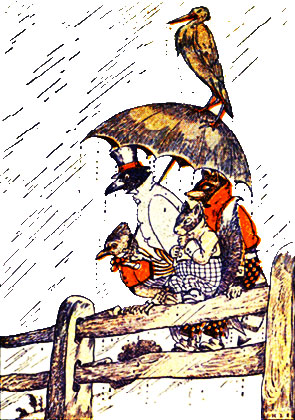
The Umbrella Seemed to be Very Heavy |
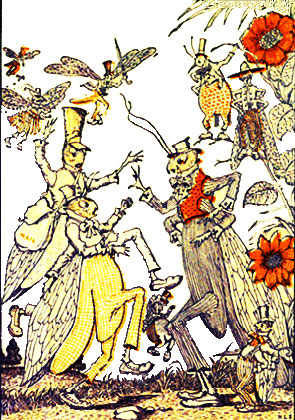
Kiddie Faced Leaper the Locust |
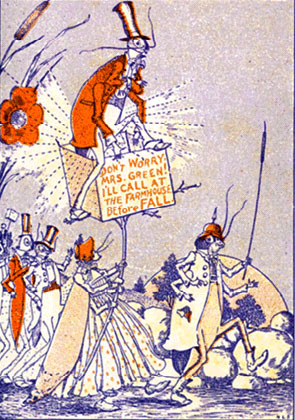
Freddie Sat on Top of the Banner |
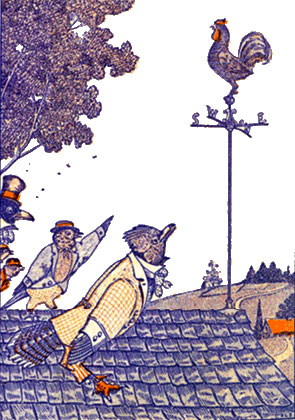
"He's A Peaceable Fellow," Said Jolly Robin |
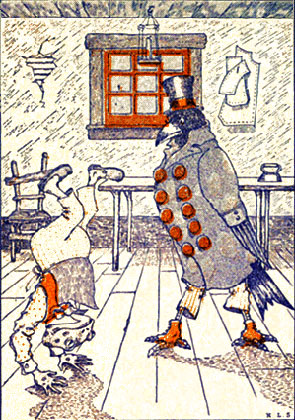
Mr. Frog Looked Over Mr. Crow's New Coat |
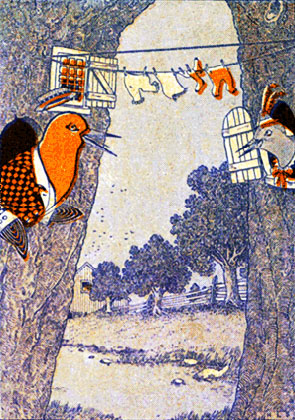
"Good Morning, My Dear!" Said Mrs. Flicker. |
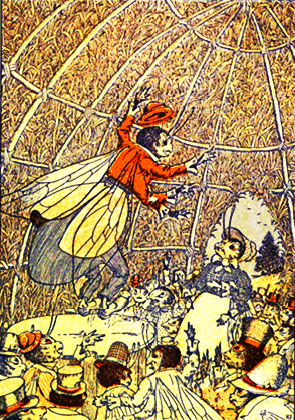
Buster Shouted For Everybody to Keep Quiet. |
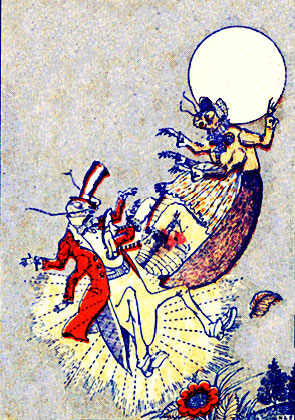
Freddie Was Bumped Into By Jennie Junebug |
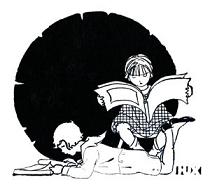
JOLLY BOOKS FOR
|
| GROSSET & DUNLAP | Publishers | New York |